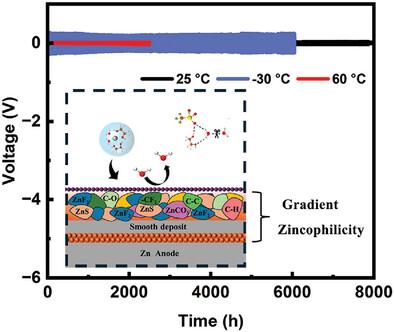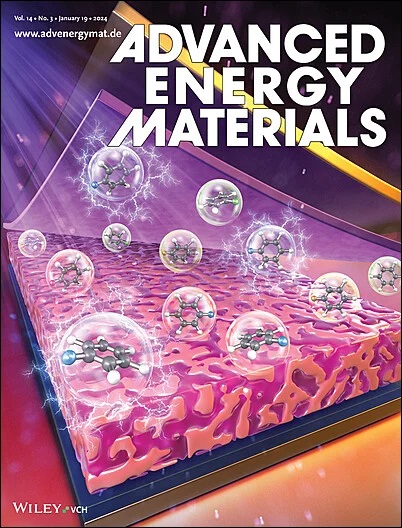In-Situ Construction of Solid Electrolyte Interphases with Gradient Zincophilicity for Wide Temperature Zinc Ion Batteries
IF 24.4
1区 材料科学
Q1 CHEMISTRY, PHYSICAL
引用次数: 0
Abstract
Dendrite growth and parasitic side reactions on zinc (Zn) metal anode are major challenges limiting the practical application of aqueous zinc ion batteries (AZIBs), particularly under wide temperatures conditions. This study proposes a novel hydrated deep eutectic solvent based electrolyte by using ethylene glycol (EG) and SnI4, enabling AZIBs to achieve excellent cycling life from −30 to 60 °C. Spectroscopic characterizations reveal H2O molecules are effectively confined within the eutectic network due to the dual effects of Zn2+ coordination and EG hydrogen bonding, thereby weakening the free water activity and broadening the electrochemical window. Furthermore, resulting from the dissociation-reduction of the eutectic molecules and SnI4, an organic-inorganic hybridized solid electrolyte interphase (SEI) layer is formed on Zn surface with the zincophile gradient, this gradient SEI layer effectively inhibits the hydrogen evolution reactions and regulates the oriented Zn deposition. The Zn//Zn symmetric cell utilizing this electrolyte achieves remarkable cycling stability of over 7800 h at room temperature, over 6000 h at −30 °C, and 2500 h at 60 °C. This work provides insights into the new approach and formation mechanism of zincophile gradient SEI layer on Zn anode, which demonstrates significant potential for developing AZIBs with high stability under wide temperatures conditions.

求助全文
约1分钟内获得全文
求助全文
来源期刊

Advanced Energy Materials
CHEMISTRY, PHYSICAL-ENERGY & FUELS
CiteScore
41.90
自引率
4.00%
发文量
889
审稿时长
1.4 months
期刊介绍:
Established in 2011, Advanced Energy Materials is an international, interdisciplinary, English-language journal that focuses on materials used in energy harvesting, conversion, and storage. It is regarded as a top-quality journal alongside Advanced Materials, Advanced Functional Materials, and Small.
With a 2022 Impact Factor of 27.8, Advanced Energy Materials is considered a prime source for the best energy-related research. The journal covers a wide range of topics in energy-related research, including organic and inorganic photovoltaics, batteries and supercapacitors, fuel cells, hydrogen generation and storage, thermoelectrics, water splitting and photocatalysis, solar fuels and thermosolar power, magnetocalorics, and piezoelectronics.
The readership of Advanced Energy Materials includes materials scientists, chemists, physicists, and engineers in both academia and industry. The journal is indexed in various databases and collections, such as Advanced Technologies & Aerospace Database, FIZ Karlsruhe, INSPEC (IET), Science Citation Index Expanded, Technology Collection, and Web of Science, among others.
 求助内容:
求助内容: 应助结果提醒方式:
应助结果提醒方式:


